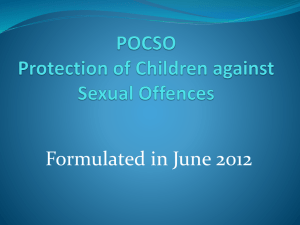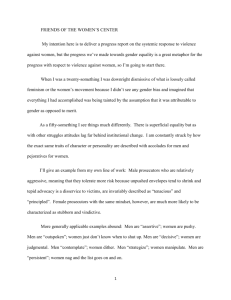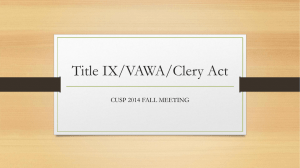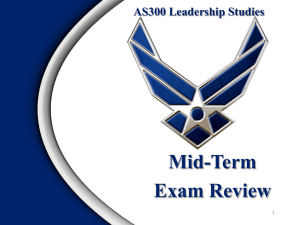Sexual Violence and Title IX
advertisement
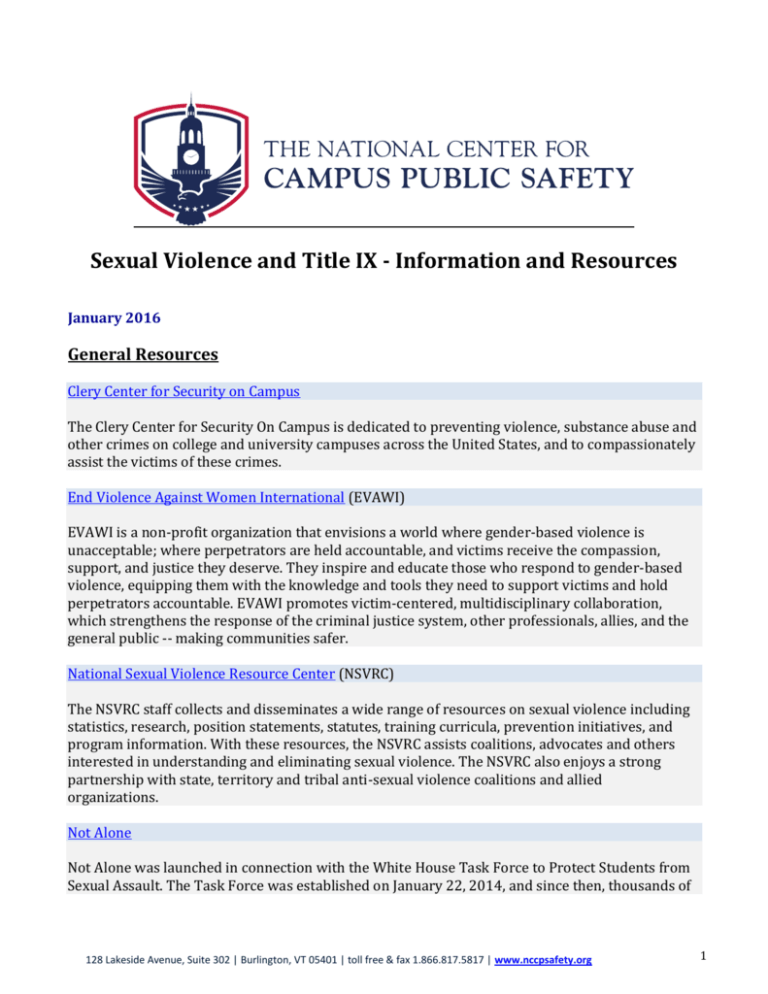
Sexual Violence and Title IX - Information and Resources January 2016 General Resources Clery Center for Security on Campus The Clery Center for Security On Campus is dedicated to preventing violence, substance abuse and other crimes on college and university campuses across the United States, and to compassionately assist the victims of these crimes. End Violence Against Women International (EVAWI) EVAWI is a non-profit organization that envisions a world where gender-based violence is unacceptable; where perpetrators are held accountable, and victims receive the compassion, support, and justice they deserve. They inspire and educate those who respond to gender-based violence, equipping them with the knowledge and tools they need to support victims and hold perpetrators accountable. EVAWI promotes victim-centered, multidisciplinary collaboration, which strengthens the response of the criminal justice system, other professionals, allies, and the general public -- making communities safer. National Sexual Violence Resource Center (NSVRC) The NSVRC staff collects and disseminates a wide range of resources on sexual violence including statistics, research, position statements, statutes, training curricula, prevention initiatives, and program information. With these resources, the NSVRC assists coalitions, advocates and others interested in understanding and eliminating sexual violence. The NSVRC also enjoys a strong partnership with state, territory and tribal anti-sexual violence coalitions and allied organizations. Not Alone Not Alone was launched in connection with the White House Task Force to Protect Students from Sexual Assault. The Task Force was established on January 22, 2014, and since then, thousands of 128 Lakeside Avenue, Suite 302 | Burlington, VT 05401 | toll free & fax 1.866.817.5817 | www.nccpsafety.org 1 people have shared their stories and ideas about how best to eliminate sexual assault in schools. Not Alone provides information for students, schools, and anyone interested in finding resources on how to respond to and prevent sexual violence on college and university campuses and in schools. Publications Building Partnerships among Law Enforcement Agencies, Colleges and Universities: Developing a Memorandum of Understanding to Prevent and Respond Effectively to Sexual Assaults at Colleges and Universities White House Task Force to Protect Students from Sexual Assault The White House Task Force to Protect Students from Sexual Assault has provided this sample memorandum of understanding (MOU), referenced in the Not Alone report, to assist campuses and law enforcement agencies to work together in their efforts to protect students, address the needs of sexual assault survivors, and ensure a prompt, thorough, and fair response to allegations of sexual misconduct. This sample MOU reflects input from task force members and agencies, outside experts on sexual assault, police associations, state attorneys general, and campus administrators and counsels. Identifying and Preventing Gender Bias in Law Enforcement Response to Sexual Assault and Domestic Violence Department of Justice (DOJ), 2015 This guidance from the Department of Justice (DOJ) is designed to help law enforcement agencies prevent gender bias in their response to sexual assault and domestic violence, highlighting the need for clear policies, robust training and responsive accountability systems. This document is intended to reflect and further DOJ's partnership with the police leaders, line officers and detectives who work tirelessly to ensure that policing is free from bias and to uphold the civil and human rights of the communities they serve. The guidance serves two key purposes. First, it aims to examine how gender bias can undermine the response of law enforcement agencies (LEAs) to sexual assault and domestic violence. Second, it provides a set of basic principles that – if integrated into LEAs’ policies, trainings and practices – will help ensure that gender bias, either intentionally or unintentionally, does not undermine efforts to keep victims safe and hold offenders accountable. Model Memorandum of Understanding (MOU) - Campus Sexual Assault Part I: How-To Guide California Attorney General’s Office, University of California, Alameda County and San Bernardino County District Attorney’s Offices, and San Francisco and Oxnard Police Departments, 2015 The How-To Guide is a step-by-step guide for stakeholders to create an MOU that reflects local needs and capacity. It is intended to provide context, suggested supplemental content, and points of discussion to assist parties as they tailor the Template MOU to their unique circumstances. The How-To Guide is organized in the same structure as the Template MOU. 128 Lakeside Avenue, Suite 302 | Burlington, VT 05401 | toll free & fax 1.866.817.5817 | www.nccpsafety.org 2 Model Memorandum of Understanding (MOU) - Campus Sexual Assault Part II: Template MOU California Attorney General’s Office, University of California, Alameda County and San Bernardino County District Attorney’s Offices, and San Francisco and Oxnard Police Departments, 2015 The Template MOU provides sample language for parties to incorporate into their local agreement. Parties may wish to adapt the Template to ensure consistency with other agreements already in place between some or all of the Parties, and to revisit any preexisting agreements to reconcile any changes in law or practice. Please consult the How-To Guide for context and additional suggestions Parties may wish to use to supplement various sections of the Template. The Model MOU does not replace or supersede the law, and does not create any enforceable rights. Similarly, it does not offer legal advice. Questions and Answers on Title IX and Sexual Violence Office for Civil Rights (OCR), 2014 In April 2014, the U.S. Department of Education’s Office for Civil Rights (OCR) issued a questions and answers document to provide additional guidance to federally funded education institutions about their obligations under Title IX to address sexual violence. This guidance further clarifies the legal requirements under Title IX articulated in OCR’s 2011 Dear Colleague Letter on Sexual Violence and its 2001 Revised Sexual Harassment Guidance. Title IX Resource Guide Office for Civil Rights (OCR), 2015 This resource guide includes an overview of the scope of Title IX, a discussion about Title IX’s administrative requirements, as well as a discussion of other key Title IX issues and references to federal resources. The discussion of each Title IX issue includes recommended best practices for the Title IX coordinator to help your institution meet its obligations under Title IX. The resource guide also explains the institution’s obligation to report information to the Department of Education that could be relevant to Title IX. This resource guide accompanies the "Dear Colleague Letter on Title IX Coordinators" and the "Letter to Title IX Coordinators." Articles ARC3 Develops Free Campus Climate Survey In 2014, the Administrator-Researcher Campus Climate Collaborative (ARC3) came together at the Georgia State University Forum on Campus Sexual Assault to begin developing their Campus Climate Survey. Read this article to learn about the free ARC3 survey and how it can be utilized on campuses. California Takes Steps To Address Sexual Assault on Campuses 128 Lakeside Avenue, Suite 302 | Burlington, VT 05401 | toll free & fax 1.866.817.5817 | www.nccpsafety.org 3 California Attorney General Kamala D. Harris is working to address sexual assault on state college campuses. Harris, along with others, developed a Model Memorandum of Understanding to be used to improve response to campus sexual assault cases. Read this article to learn more about the details of the model MOU. White House Task Force Releases New Resources for Campus Communities Two new resources have been released that address sexual violence on campus. The resource guide is complied of various materials and is designed to support campus community members. The Safe Place resource kit is specifically for campus health centers and how they can respond to trauma of sexual violence. Training Adult Sexual Assault: A Trauma Informed Approach Michigan Domestic and Sexual Violence Prevention and Treatment Board, 2014 This training video was designed so that it can be used in a brief in-service training or two short training sessions as part of roll call or shift change briefings at your agency. The training provides an overview of how trauma impacts victims and how law enforcement first responders can implement a trauma informed response and approach to sexual assault survivors. The training video features Dr. Rebecca Campbell, Chief Tom Tremblay (Ret.) and law enforcement professionals from across Michigan. The video is available as a training resource for law enforcement and allied professionals. A facilitator’s guide to help you use the training film as part of training is also available. Implications of the Clery Act and Title IX for Overseas and Distance Locations University Risk Management & Insurance Association (URMIA) In 2013, URMIA produced a free member webinar on the implications of the Clery Act and Title IX for overseas and distance locations. This presentation explains, in plain English, the standards laid out by the Clery Act in distance and overseas study, as well as the interplay between the Clery Act and Title IX for reports of sex offenses that occur overseas. The presentation also includes an update on Clery Act and Title IX reporting changes arising from the amendments to the Violence Against Women Act. Online Training Institute (OLTI) End Violence Against Women International (EVAWI) EVAWI offers free self-paced courses on the topic of criminal justice response to sexual assault. EVAWI also offers archived webinars (both free and for a fee) on various topics related to sexual assault. Title IX Coordinator Training 128 Lakeside Avenue, Suite 302 | Burlington, VT 05401 | toll free & fax 1.866.817.5817 | www.nccpsafety.org 4 National Association of College and University Attorneys (NACUA) This eight-session course is designed specifically for campus Title IX Coordinators and other administrators with Title IX responsibilities and includes April 2014 federal government guidance. Trauma-Informed Sexual Assault Investigation and Adjudication Educational Program National Center for Campus Public Safety (NCCPS) After rigorous curriculum development, pilot program testing, evaluation, and updates, as well as the evaluation and vetting of 26 additional faculty instructors, the NCCPS is pleased to announce that the Trauma-Informed Sexual Assault Investigation and Adjudication Educational Program will be available to the public beginning in 2016. This groundbreaking curriculum is the result of endless hours of work with nationally recognized subject matter experts in the fields of sexual and gender-based violence investigations, Title IX, the Clery Act, victim's advocacy, student conduct, and psychology. The first public educational program will be held February 23-26, 2016 in Tampa, FL hosted by Hillsborough Community College. Program registration is available to representatives from institutions of higher education and their local partners involved in the investigation and adjudication of reports of sexual and gender-based violence on campus. We encourage representation from campus/community multi-disciplinary teams, and will therefore accept registrations for up to five individuals per institution, per program. You Have Options Program (YHOP) Trainings The You Have Options Program (YHOP) has three goals: 1) increase sexual assault reporting by eliminating as many barriers to reporting as possible, 2) increase identification and prosecution of sexual offenders, and 3) decrease sexual assault victimization. Agencies participating in the YHOP receive training in law enforcement options for sexual assault reporting and best practice law enforcement strategies to assist in the identification and investigation of sexual offenders. YHOP facilitates a number of training events including: -Introduction to the Forensic Experimental Trauma Interview (FETI) -Practical Application of the Forensic Experimental Trauma Interview (FETI) -YHOP Introductory Session 128 Lakeside Avenue, Suite 302 | Burlington, VT 05401 | toll free & fax 1.866.817.5817 | www.nccpsafety.org 5


